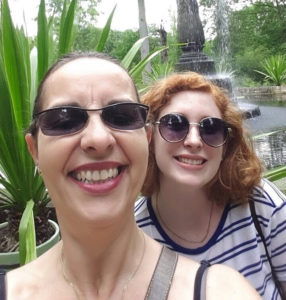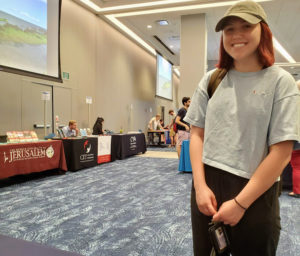Studying abroad is, in short, an experience unlike any other. Hearing the
enthusiastic accounts of students who have studied abroad in the past is only the tipping
point of the true joy that spending time in a new place can bring. It’s only natural to hear
study abroad being described as something that will “change your life,” or “broaden your
horizon.” While these phrases may seem routine and overused, the realization of how

Learning the various ways to spell my name, Kaitlin, in a calligraphy class in Japan
true these words are only come with taking a step out of your comfort zone and going abroad. As an example, after having spent two months in Okinawa, Japan with student exchange organization called Youth for Understanding, I learned first-hand how these phrases are indispensable and in many ways, define my experiences overseas. One aspect of studying abroad that those who have gone abroad often gloss over, however, is the academic component. Going overseas may seem like a fun vacation during much of the time that one is away from home, but there are indeed many academic benefits.
For a student of foreign language and culture, the academic aspect of going abroad may not always be immediately apparent, especially when you’re surrounded by some of
the many beauties of a new place. Overall, the main and most important word in study abroad is study. During the time away, you must be proactive in keeping up with the classes you have to take. One thing to emphasize, however, is that learning can take place in so many more places that the classroom. This is the main reason why I believe study abroad should be a main component for those specializing in these particular subjects. Living day-to-day as a native will truly be instrumental in the learning process.
As mentioned, it is imperative that students of foreign languages and cultures go
abroad. Whether it be for a summer, a semester, or an entire year, missing that chance
would be especially disappointing. Going to a new country, especially a country with the
target language or culture you are studying is unforgettable. Speaking the language you’ve
been studying with natives, seeing right in front you the sights you’ve only seen in
pictures, and tasting the food you’ve only heard about creates an indescribable sense of
happiness and accomplishment. In fact, these types of adventures are some of the most
important for a foreign language and cultures student to take part in. Being able to test
one’s skills and improve all while being allowed to absorb culture all at the same time is
something that I think is quite beautiful. On the other side of this, the study abroad
experience won’t always be so exciting. There will surely be days when you will be
frustrated with your own language skills and may even get tired of the new sights and
foods that you were once so adamant about seeing and trying. These, however, are normal emotions, and need to be felt. I find that these feelings will, contrary to popular belief, make one even stronger in their pursuits of learning languages and cultures. No matter what, the
opportunity to study abroad is not to be missed. By the time of your departure back home,
not only will you have learned so much, but you may even have one of the exciting,
seemingly never-ending stories that previous students who studied abroad always have!




